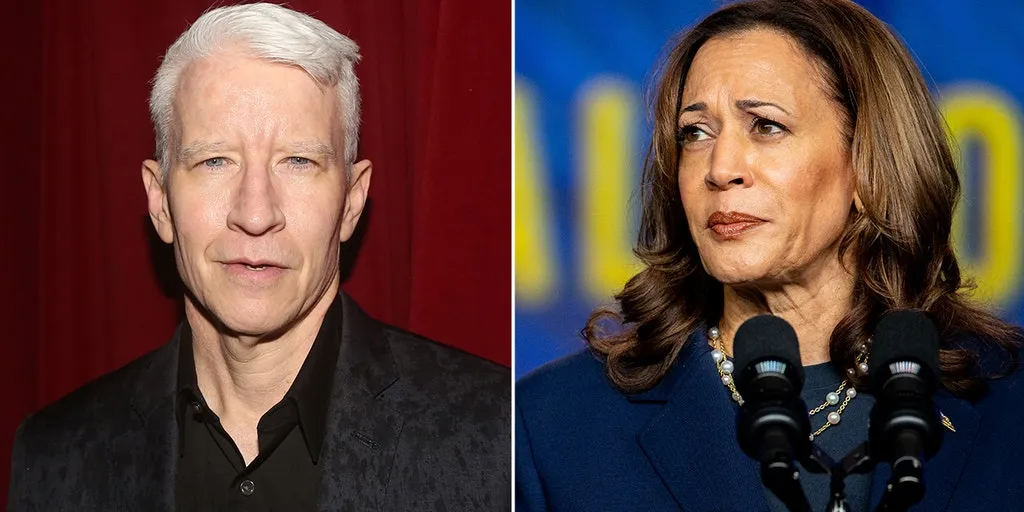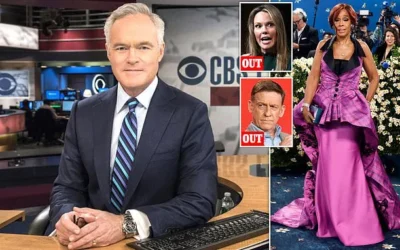Kamala Harris’s Post-Debate Fallout: A Look Inside ‘Original Sin’
The world of American politics is often a stage for high drama, and the recent revelations from the book ‘Original Sin’ have added yet another layer of intrigue to the narrative surrounding Vice President Kamala Harris. According to reports, after a particularly brutal interview regarding President Joe Biden’s performance in a debate, Harris did not hold back her feelings towards CNN’s Anderson Cooper, resulting in a backlash that has taken the political arena by storm.
The Context: Biden’s Debate Performance
During the presidential campaign debates leading up to the Biden presidency, the stakes were exceedingly high. The nation was in turmoil, grappling with the aftermath of a contentious election cycle, a pandemic, and rising social unrest. President Biden, tasked with defending his policies and character, faced significant pressure during the debates. As documented in ‘Original Sin,’ one particular debate was a low point, marked by missteps and unclear messaging that left many questioning his readiness to lead.
Anderson Cooper’s Interview
Following this debate, Anderson Cooper sat down with Kamala Harris for a discussion that many expected would be a gentle post-mortem. However, ‘Original Sin’ reveals that Cooper was anything but soft in his questioning. His probing inquiries about Biden’s debate performance quickly turned into a tense back-and-forth that put Harris on the defensive.
Harris’s Reaction: A Firestorm Unleashed
The aftermath of the interview, as described in the book, reveals shocking details of Harris’s reaction. Sources close to the Vice President report she exploded in anger, referring to Cooper in expletives that are not suitable for print. The book quotes her referring to Cooper as a “motherf—er” in frustration, indicating a significant breach in the typically composed demeanor Harris is known for.
The Implications of Her Outburst
This outburst brings to light not only the stress levels experienced by high-level politicians, particularly in a tumultuous environment but also showcases the deep frustration Harris felt. The notion that a Vice President would so vocally express her displeasure with a major media figure speaks volumes about the pressures of political life and the unintended consequences of media scrutiny.
Historical Context: Women in Politics and Media
Women in politics have often faced a double standard in how their emotions are portrayed in the media. Harris’s reaction towards Cooper raises important discussions about gender dynamics in political communications. While male politicians can express frustration and anger without the same widespread backlash, female leaders are often labeled as “emotional” or “hysterical.” This incident underscores the need to address such biases in how emotional responses are perceived.
Wider Reactions from Politicians and Analysts
In the days following the fallout, various politicians and analysts weighed in on Harris’s clash with Cooper. Some expressed understanding of her frustration, noting that the pressure of representing the Biden administration must be extraordinarily taxing given the challenges they are facing. Others took a more critical stance, suggesting that Harris’s outburst was unprofessional and unbecoming of a Vice President.
Lessons in Emotional Management
Politically savvy individuals often advise tact and restraint during interviews, especially in high-stakes situations. For Harris, maintaining a level of professionalism while conveying genuine feelings can be a fine line to walk. This incident highlights the importance of emotional management in politics, as public perception can sway dramatically based on how leaders handle themselves in front of the camera.
Media’s Role in Shaping Public Perception
Cooper’s interview with Harris is just one part of a larger narrative about how the media plays a crucial role in shaping public perception of political leaders. It raises essential questions about journalistic responsibility and the fine balance they must walk between holding politicians accountable and sensationalism. While interviews like Cooper’s are part of the job, they can have real-world implications that reverberate throughout political circles.
The Impact of Social Media
In today’s political environment, social media amplifies the effects of such outbursts significantly. With platforms like Twitter, Facebook, and Instagram, Harris’s words and emotions can spread rapidly, shaping how voters perceive her and the administration. This interconnectedness further complicates how elected officials communicate their messages and manage public discourse.
The Fallout: What’s Next for Harris?
What does this mean for Kamala Harris’s political future? As the Biden Administration continues its campaign efforts, maintaining unity and a controlled image will be key. Harris is often targeted by opposition parties for her decisions and demeanor; this incident could provide ammunition for critics. However, it could equally galvanize her supporters who view her as a relatable figure facing the same frustrations as everyday Americans.
Conclusion: Navigating a Challenging Landscape
The anecdote presented in ‘Original Sin’ serves as a reminder that behind the polished exterior of political figures lies a plethora of emotions and tensions. History has shown that human reactions, however raw, can sometimes resonate more with the public than scripted discourse. It raises critical questions about authenticity, emotional expression, and the consequences of public scrutiny in politics.
As the Biden administration continues to navigate the turbulent waters of governance, Harris’s experience with Anderson Cooper serves as a clear indication that even at the highest levels of power, the intersection of media, politics, and personal emotions remains a complex and challenging landscape to traverse.







